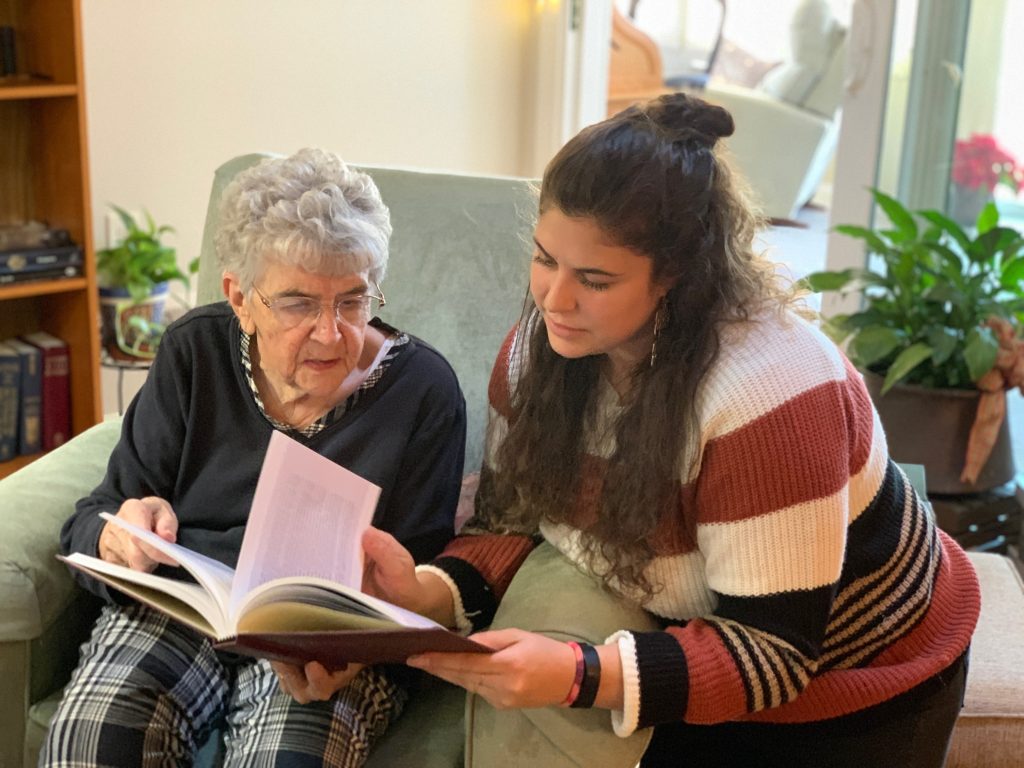
You may know where your grandparents, or even great-grandparents, grew up. For some of us, those roots wind through years of resilience, survival, and overcoming. Some of our great-grandparents found refuge on ships taking them to a better life. Others found a better life in spite of their circumstances, in spite of those ships.
Their stories live on within us.
We often hear Life Story Book recipients—children and grandchildren—say, “I never thought to ask that question.” Or, “I’ve never heard that story before.” Sadly, we also frequently hear: “I wish I would’ve asked when I had the chance.”
Uncovering your family history and preserving life stories tends to be something that many of us think about when it’s too late. When we’re younger, we retain bits and pieces of what we deem interesting. But when we’re older—when we reflect on what it means to live a good life—we can better appreciate the importance of memories, both joyful and painful, that live on.
In a 1948 speech to the British House of Commons, Winston Churchill said, “Those that fail to learn from history are doomed to repeat it.” It’s crucial for us to know and preserve our history from a sociological perspective, of course, but understanding is just as important to our identity, purpose, and sense of place. Who are we?
Here are five reasons why we believe it’s important to preserve your family stories:
A Sense Of Connectedness:
We, the human race, are incredibly intertwined. Who can you trace your roots back to? (Fact: The reason you can trace is because someone documented along the way.) Understanding your family lineage and genealogical records puts you in the context of our whole history—migrations, conflicts, notable achievements, and so on. In addition to finding identity and belonging in your nuclear family, this leads to connectedness in the broader, grander scope. We are all connected in the human experience.
Cultural Traditions & Heritage:
Much like oral storytelling, cultural traditions are passed down through generations by hearing, seeing, and doing. Our family stories are a deep well of cultural heritage, customs, and languages, allowing us to better understand the origins of why we celebrate certain holidays, eat certain foods, or observe certain cultural norms. Preserving your history ensures that the unique lens through which your family embraces your cultural heritage is not lost to time.
Life Lessons:
Maybe you’ve heard the saying, “Do as I say, not as I do.” For better or worse, we are shaped—especially in our youth—by what is modeled for us. We then determine if that model is the best path forward in our own lives. Looking back to the lessons and experiences of our ancestors gives us a head start on these decisions, provides insight into overcoming difficulties, and often inspires how we navigate the world around us. We can take lessons from both their failures and successes. We can also better appreciate the unique value that each family member brings to the dynamic. Sometimes, that value is in the demonstration of what not to do.
Strengthening Relationships:
When we’re young, we often have an idealized view of our parents and grandparents. When that shimmer dulls, we realize that those individuals are varying levels of imperfect. We won’t sugarcoat it: Sharing and preserving family stories can be really difficult if relationships are fractured. However, the process often brings healing. In a recent life story book project, a granddaughter recounted that reading her grandmother’s story reminded her that the 80-year-old woman she knew was once her own age, 30, with her own dreams and hopes. In this way, preserving life stories develops deeper empathy among family members, humanizing the ones we love through a new lens and fostering unity between relatives. Plus, you have the added bonus of a new shared, powerful, experience.
A Legacy Worth Preserving:
“I don’t really have any stories to share.” You’d be surprised how often we hear this phrase at the beginning of a Life Story Book Project. And then, like clockwork, the stories begin pouring out. The preservation of your story, your parents’ story, or your grandparents’ story is far beyond just a book—it’s a gift for future generations that allows the inheritance of something far greater than material goods. That inheritance is one of impact, values, stories, memories, and beyond. Your legacy is worth preserving and, better yet, encourages future generations to carry the family heritage and name with pride and understanding.
Yes, preserving your family history is about honoring the past, but it’s also about continuing the legacy, traditions, and lessons from our ancestors that are so richly woven into the tapestry of our bloodline. The best time to start is now.
